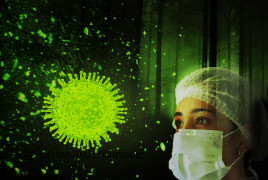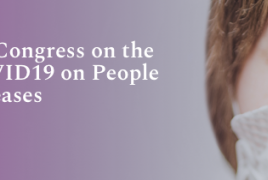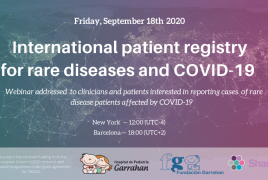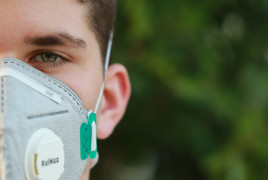
COVID-19 and rare diseases: boosting research to improve care

As part of the recent celebration of Rare Disease Day, the CREER Foundation (Spanish reference care centre for rare diseases) held an open day for professionals and affected people to share the latest advances and knowledge on treatments, care, research and psychosocial impact. During the event, Dr. Marcelo Andrade and Share4Rare coordinator, Begonya Nafria, presented some of the preliminary results collected from the international registry of patients with COVID-19 and rare diseases, launched in mid-2020 in collaboration with the Garrahan Hospital and the Garrahan Foundation, ALAPA, FADEPOF and Sant Joan de Déu Barcelona Children’s Hospital.
From the total number of registered cases, 47% are women and 53% are men, the vast majority being minors (the average age is 7.3 years). 74% of the registered patients are from Latin America and the rest are European citizens.
Regarding the underlying disease, there is a huge diversity of typotologies: metabolic, hematological, neuromuscular, respiratory, immunodeficiencies, kidney, cardiovascular, endocrine, digestive diseases or patients without a diagnosis.
The vast majority of those registered (69%) were symptomatic, this percentage decreasing significantly in the case of European patients (24% of symptomatic versus 76% of symptomatic in Latin America). Half of the people registered did not have severe respiratory symptoms associated with COVID-19, 27% had an upper respiratory infection and only 11% developed pneumonia. The most common symptoms were fever (47%), cough (40%), and breathing problems (16%).
In a preliminary way, the registry reveals that the majority of patients present a favourable evolution and that there is a different impact between patients in America and Europe (which could be explained by the different structure of the health system and/or contact tracing). Regarding the effect of COVID-19 on underlying rare diseases, two of the deceased patients had septo-optic dysplasia, two had a severe lung disease and two lacked a diagnosis. In the case of metabolic diseases, 50% of patients with propionic acidemia were admitted to the ICU due to metabolic decompensation.
When asked about the treatments of the underlying rare disease, 11% had to suspend it due to COVID-19. Significantly, all patients manifested inconveniences in the access to professionals and therapies during the pandemic.
Although all these results are preliminary, certain patterns are already beginning to be drawn about the effect of COVID-19 in people with a rare disease. We need more information to be able to complete the puzzle and help the affected people. Will you help us? If you know someone who suffers from a rare disease and has passed COVID-19, you can invite him or her to join the registry. If you are a clinician and have visited patients with COVID-19 and a rare disease, please take a few minutes to include them on the registry. Together we are stronger!




